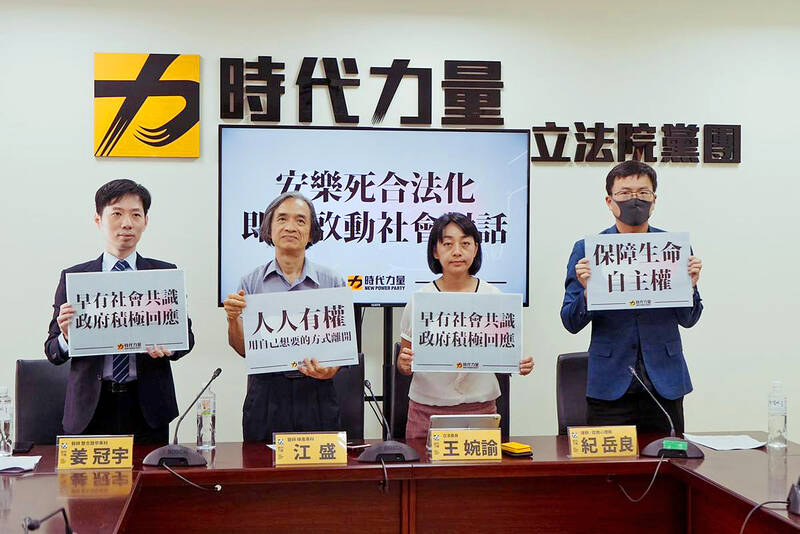The New Power Party (NPP) on Monday announced that it is proposing legislation to legalize euthanasia, saying it is time that Taiwanese society had genuine discussions on the issue.
A survey conducted in 2014 by Chinese-language weekly magazine Business Today found that 77 percent of respondents supported euthanasia.
An Internet poll by the Taiwan Tongzhi (LGBTQ+) Hotline Association in 2017 found that 92 percent of respondents supported legislation to legalize euthanasia.

Photo courtesy of NPP
“Facing all the controversies, our responsibility as legislators is to initiate genuine dialogue on the issue in society, which should seek to break past taboos and reach a consensus. Legislation should be stipulated to guarantee everyone’s autonomy over their own lives,” NPP Chairwoman Claire Wang (王婉諭) told a news conference in Taipei.
The euthanasia bill proposed by the NPP states that people should have the right to have their lives ended if they have a terminal illness and are experiencing unbearable pain, even after being given proper care and treatment, Wang said.
“Considering ethical issues that healthcare professionals might face in ending the lives of critically ill patients, the bill would give doctors the right to turn down a request for euthanasia at any time. The government should also have a mechanism in place to let other doctors carry out the procedure instead,” she said.
“Medical professionals who are willing to carry out euthanasia should be exempt from being responsible for medical liability issues,” Wang added.
She said that the government should ensure that organizations that offer physician-assisted suicide are staffed with licensed and certified professionals.
“The government should carefully examine each request for physician-assisted suicide and ascertain the legality of each case,” Wang said.
Obstetrician and gynecologist Chiang Sheng (江盛) said that a mature society needs legal euthanasia.
“Euthanasia is an individual’s right to freedom and autonomy, and falls within the scope of legal human rights. Empirical evidence has shown that while a majority of critically ill patients who remain conscious do not need euthanasia, about 4.6 percent of such patients would choose to end their lives with euthanasia and physician-assisted death,” Wu said.
Physician Chiang Kuan-yu (姜冠宇), who specializes in integrated medicine and hospice care, said that the medical community in Taiwan has reached some consensus on the issue.
“First, doctors have a responsibility to reduce patients’ pain, but they must also respect patients’ choice for dignity in life. Second, any decision to terminate a person’s life must be subject to strict medical and ethical review,” he said.
“One of the main disputes over euthanasia is whether it can be allowed as an option if there are limited medical resources to relieve the social and economic pressure that a country must bear,” Chiang said.
Another issue under dispute is that economically disadvantaged patients would be forced to consider the option of euthanasia if it is legalized, he said, adding that a comprehensive and well-rounded system is necessary.
Attorney Chi Yuan-liang (紀岳良) said that his experience of caring for his father, who had terminal cancer, made him realize that only a minority of patients can access hospice care due to limited capacity.
“Taiwan is proud of itself as a democratic and free nation. Modern medical technology could make people live in a state of ‘half-life.’ The government should be responsible for offering euthanasia as an option for patients with terminal illnesses,” he said. “There is no excuse to delay such legislation anymore.”

Travel agencies in Taiwan are working to secure alternative flights for travelers bound for New Zealand for the Lunar New Year holiday, as Air New Zealand workers are set to strike next week. The airline said that it has confirmed that the planned industrial action by its international wide-body cabin crew would go ahead on Thursday and Friday next week. While the Auckland-based carrier pledged to take reasonable measures to mitigate the impact of the workers’ strike, an Air New Zealand flight arriving at Taipei from Auckland on Thursday and another flight departing from Taipei for Auckland on Saturday would have to

The Taipei City Government yesterday confirmed that it has negotiated a royalties of NT$12.2 billion (US$380 million) with artificial intelligence (AI) chip giant Nvidia Corp, with the earliest possible signing date set for Wednesday next week. The city has been preparing for Nvidia to build its Taiwan headquarters in Beitou-Shilin Technology Park since last year, and the project has now entered its final stage before the contract is signed. Taipei Mayor Chiang Wan-an (蔣萬安) said the city government has completed the royalty price negotiations and would now push through the remaining procedures to sign the contract before

Taipei Zoo welcomes the Lunar New Year this year through its efforts to protect an endangered species of horse native to central Asia that was once fully extinct outside of captivity. The festival ushering in the Year of the Horse would draw attention to the zoo’s four specimens of Przewalski’s horse, named for a Russian geographer who first encountered them in the late 19th century across the steppes of western Mongolia. “Visitors will look at the horses and think that since this is the Year of the Horse: ‘I want to get to know horses,’” said zookeeper Chen Yun-chieh, who has been

The Ministry of Foreign Affairs on Thursday said the name of the Taiwanese Representative Office in Lithuania was agreed by both sides, after Lithuania’s prime minister described a 2021 decision to let Taiwan set up a de facto embassy in Vilnius as a “mistake.” Lithuanian Prime Minister Inga Ruginiene, who entered office in September last year, told the Baltic News Service on Tuesday that Lithuania had begun taking “small first steps” aimed at restoring ties with Beijing. The ministry in a statement said that Taiwan and Lithuania are important partners that share the values of freedom and democracy. Since the establishment of the